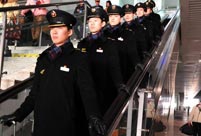 Cockfighting show staged in E. China's Heze during Spring Festival
Cockfighting show staged in E. China's Heze during Spring Festival
 Chinese New Year Flower Fair opens in San Francisco
Chinese New Year Flower Fair opens in San Francisco
 Festivities in Shanghai
Festivities in Shanghai
 PLA navy conducts drill in North China Sea
PLA navy conducts drill in North China Sea
 World's high-tech hotels
World's high-tech hotels
 Li Na poses with trophy on Brighton Beach in Melbourne
Li Na poses with trophy on Brighton Beach in Melbourne
 Six Chinese divers back safely after 300-meter saturation dive
Six Chinese divers back safely after 300-meter saturation dive
 Traditional wedding ceremony of Yao people
Traditional wedding ceremony of Yao people
 Taipei Game Show attracts geeky gamers
Taipei Game Show attracts geeky gamers
SEOUL, Feb. 3 -- South Korea and the Democratic People 's Republic of Korea (DPRK) agreed Monday to hold working-level talks between Red Cross officials this week to sort out details on the agreed family reunion.
Unification Ministry spokesman Kim Eui-do told a press briefing that Pyongyang accepted Seoul's earlier proposal for the working- level contact, saying that the DPRK offered to hold the talks on Wednesday or Thursday at South Korea's convenience at Tonilgak, an administrative building on the DPRK side of the truce village of Panmunjeom.
Kim said that the DPRK sent the notice of such proposal at around 10 a.m. through the Panmunjeom liaison office.
Two hours after receiving the notice, South Korea sent its own notice to the DPRK, offering to hold the working-level meeting on Wednesday at the border village, an official at the Unification Ministry said by phone.
A week earlier, Seoul offered to hold the working-level contact on Jan. 29 to sort out details on the agreed family reunion, but it failed to be held as Pyongyang gave no response.
On Jan. 24, the two Koreas agreed to hold the reunion of families separated by the 1950-53 Korean War. Seoul proposed the reunion date to be held from Feb. 17 to 22, which Pyongyang had agreed to.
The South Korean government hailed the DPRK's response to its suggestion, though belatedly, the spokesman said, adding that it will decide on and notify the DPRK of the contact date within Monday.
The two Koreas originally planned to hold the reunion event in late September last year for relatives of both sides who failed to meet each other for six decades as the civil war ended in armistice, not peace treaty.
The DPRK, however, abruptly delayed the reunion at the last minute. At that time, Pyongyang sought to link the humanitarian event to the resumption of tour to its scenic resort of Mount Kumgang, but Seoul tried to deal with the humanitarian issue separately from the tourism issue.
Tensions eased on the Korean Peninsula after Kim Jong Un, top leader of the DPRK, said in his New Year's address that Pyongyang will "create atmosphere to ameliorate the relations" between the two Koreas.
South Korean President Park Geun-hye responded positively to Kim's speech, proposing at her New Year's press conference to hold the family reunion.
Since Kim's speech, the DPRK repeated its peace overture, saying that the two Koreas should stop all hostile acts starting from Jan. 30 on the eve of the Lunar New Year.
Concerns remained ahead of the annual joint military drills between Seoul and Washington. South Korean military has confirmed that it will conduct the Key Resolve and the Foal Eagle war games with the United States from late February to April as scheduled, noting that the military exercises were defensive in nature.
Last year, the U.S. Air Force's B-2 stealth bombers carried out its first-ever firing drill in South Korea during the joint exercises. The U.S. military also deployed other nuclear-capable weapons such as B-52 bombers and submarine USS Cheyenne.
It was known that no U.S. aircraft carrier would participate in this year's joint military drills in what appeared to be their efforts to minimize the possible backlash from the DPRK, which denounced the exercises as the rehearsal for the northward invasion.
Related: DPRK proposes working-level contacts for family reunion this week
 3D film 'The Monkey King' premieres in Beijing
3D film 'The Monkey King' premieres in Beijing  Miss Chinese Int'l Pageant 2014 held in Hong Kong
Miss Chinese Int'l Pageant 2014 held in Hong Kong 'Golden Flowers' in the Spring Festival travel rush
'Golden Flowers' in the Spring Festival travel rush Li Na beats Cibulkova to win Australian Open
Li Na beats Cibulkova to win Australian Open Sexy models at Taipei Game Show 2014
Sexy models at Taipei Game Show 2014 'Living in ice house' competition held in central China
'Living in ice house' competition held in central China  Highlights of Chinese airborne troops'exercises
Highlights of Chinese airborne troops'exercises  All-male high speed train crew during Spring Festival travel rush
All-male high speed train crew during Spring Festival travel rush PLA navy drills in East China Sea
PLA navy drills in East China Sea President Xi visits border troops ahead of Lunar New Year
President Xi visits border troops ahead of Lunar New Year What do Chinese pack in their luggage in Spring Festival Rush?
What do Chinese pack in their luggage in Spring Festival Rush? Blind date fair in Hangzhou of Zhejiang province
Blind date fair in Hangzhou of Zhejiang province Film 'Where Are We Going, Dad' premiered in Beijing
Film 'Where Are We Going, Dad' premiered in Beijing  Australian Open champion Li Na returns to hometown Wuhan
Australian Open champion Li Na returns to hometown Wuhan Twin sisters serve during Spring Festival travel rush for the first time
Twin sisters serve during Spring Festival travel rush for the first timeDay|Week|Month